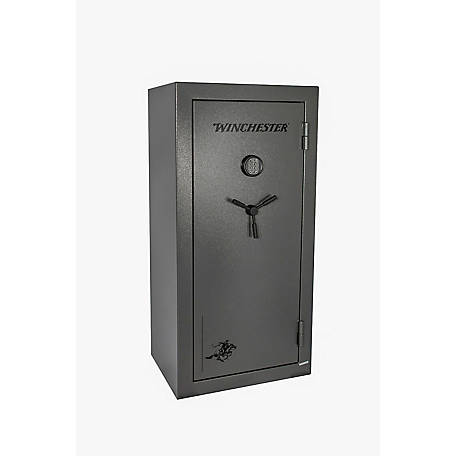When it comes to protecting your long guns, choosing the right safe is crucial. But have you ever wondered what gauge steel is best for a long gun safe?
The thickness of the steel can make all the difference between a safe that keeps your firearms secure and one that’s easy to break into. You’ll discover how steel gauge impacts the strength and durability of your safe. By the end, you’ll know exactly what to look for to keep your collection safe and sound.
Keep reading to make the smartest choice for your firearms protection.

Steel Gauge Basics
Choosing the right steel gauge is key for a long gun safe. Steel gauge shows how thick the metal is. The thickness affects the safe’s strength and protection. Thicker steel means better resistance to break-ins. Understanding steel gauge helps pick a safe that suits your needs and budget.
Gauge Measurement Explained
Steel gauge measures metal thickness. The number goes down as the metal gets thicker. For example, 12 gauge steel is thicker than 16 gauge. Gauge measures are standard in the U.S. It helps compare materials easily. Thicker steel is harder to cut or break.
Common Gauges For Gun Safes
Gun safes often use 12, 14, or 16 gauge steel. 12 gauge offers strong protection but costs more. 14 gauge is a good balance of strength and price. 16 gauge is thinner and less costly but less secure. Choose based on how much protection you want and your budget.

Factors Influencing Gauge Choice
Choosing the right gauge steel for a long gun safe depends on several important factors. Each factor affects the safe’s strength, weight, and price. Understanding these elements helps pick the best steel gauge for your needs.
Security Needs
Steel gauge impacts how well a safe protects your guns. Thicker steel means stronger defense against break-ins. High-security safes use lower gauge numbers like 10 or 12. These safes resist drills and prying tools better than thinner steel. For basic protection, thinner steel around 14 gauge may be enough. Consider how much security your firearms require.
Safe Size And Weight
Thicker steel increases the safe’s weight and size. Heavy safes are harder to move or steal. Larger safes with thicker steel need strong floors and more space. Thinner steel keeps the safe lighter and easier to handle. Balance the safe’s size with the steel gauge to fit your room and floor limits.
Budget Considerations
Thicker steel costs more because of the material and manufacturing. Safes with 10 or 12 gauge steel are pricier but offer better protection. Thinner steel safes are cheaper but less secure. Decide how much money you want to spend on security. A good budget helps you choose the right gauge without overspending.
Popular Steel Gauges For Long Gun Safes
Choosing the right steel gauge is key for a long gun safe. Steel gauge means the thickness of the metal. The thicker the steel, the stronger and more secure the safe. Different steel gauges offer different levels of protection and price points. Understanding the popular steel gauges helps you pick the best option for your needs.
14-gauge Steel
14-gauge steel is a common choice for budget-friendly safes. It is about 0.0747 inches thick. This steel can stop quick attacks but may not resist heavy tools. It is lighter and easier to move than thicker options. Good for basic security and indoor use.
12-gauge Steel
12-gauge steel is thicker at 0.1046 inches. It offers better protection against pry bars and drills. This thickness is popular for mid-range safes. It balances security and cost well. Ideal for most gun owners wanting solid protection.
10-gauge Steel And Thicker
10-gauge steel is very strong, measuring 0.1345 inches or more. Safes with this steel resist heavy attacks and forced entry. Some safes use even thicker steel for maximum security. These safes are heavier and more expensive. Best for high-value collections and high-risk areas.
Comparing Steel Thickness And Security
Choosing the right steel gauge for a long gun safe directly affects its security. Steel thickness plays a big role in protecting your firearms. Thicker steel means stronger defense. Thinner steel may be easier to cut or break. Understanding how steel gauge impacts safety helps you pick the best safe.
Resistance To Forced Entry
Thicker steel resists cutting tools and drills better. It slows down thieves and makes breaking in harder. Safes with thin steel panels can be breached quickly. Heavy-gauge steel creates a tough barrier. It improves the safe’s ability to keep guns secure. Investing in thicker steel means better protection against forced entry.
Durability And Longevity
Steel thickness affects how long a safe lasts. Thicker steel stands up to dents and wear over time. It does not warp or weaken easily. Thin steel can bend or dent from impacts. A durable safe protects your firearms for many years. Choosing higher gauge steel ensures long-term security and value.
Additional Materials And Reinforcements
Choosing the right gauge steel is important for a long gun safe. Steel alone does not make a safe strong. Many safes have extra materials inside. These materials add strength and protection. They help keep guns safe from theft and damage.
These extra layers also protect from fire and break-ins. Reinforcements stop tools from cutting or prying open the safe. It is smart to know about these materials. They help decide which safe offers the best security.
Composite Panels
Composite panels are layers of different materials combined. They often include metal, plastic, and fiber. These panels make the safe harder to break. They add thickness without too much weight. Composite panels absorb impact and resist cutting tools. This helps protect the safe from attacks.
These panels also reduce noise when the safe is opened or closed. They keep the contents quiet and hidden. Many strong safes use composite panels inside the steel walls. This adds another level of security beyond just the steel gauge.
Concrete And Fireproofing Layers
Concrete layers are common inside gun safes. This material adds heavy protection. Concrete stops tools from drilling or cutting through. It also helps protect guns from fire damage. Fireproofing layers often include special materials that resist heat. These layers keep the safe cool inside during a fire.
The combination of concrete and fireproofing makes the safe tougher. It slows down heat and prevents guns from harm. Safes with these layers provide peace of mind. They protect guns from theft and fire at the same time.
Balancing Weight And Portability
Choosing the right gauge steel for a long gun safe means finding a good balance between weight and portability. The safe must be strong enough to protect your firearms but also manageable in size and weight. Too heavy, and it becomes hard to move or install. Too light, and it might not offer enough security. Understanding this balance helps you pick a safe that suits your needs perfectly.
Heavy Vs. Lightweight Safes
Heavy safes use thicker steel gauges, usually 10 or lower. This thickness provides strong protection against break-ins. They are harder to carry or move, which adds security. Burglars find it difficult to steal or damage heavy safes.
Lightweight safes use thinner steel, often 12 gauge or higher. These safes are easier to move and fit in smaller spaces. They may not resist attacks as well as heavy safes. But they work well if you need portability or must fit the safe in tight places.
Installation Considerations
Heavy safes may require professional installation. Floors must support the weight, or damage could occur. You may need extra help to move the safe into place.
Lightweight safes are easier to install by yourself. They fit well in closets or small rooms. Bolting the safe to the floor or wall adds security. Proper installation improves the safe’s overall protection.
Tips For Choosing The Right Safe
Choosing the right safe for your long guns is important. The safe must protect your firearms from theft, fire, and damage. You want a safe that fits your collection and meets your security needs. Consider several factors before making your choice.
Think about size, steel thickness, locking system, and fire rating. These features affect safety and convenience. Use these tips to help you find the best long gun safe for your home.
Assessing Your Firearm Collection
Count all your long guns. Include rifles, shotguns, and any large firearms. Know the total number and sizes. This helps determine the safe size and layout you need. Leave extra space for new firearms or accessories. Organize guns so they fit well inside the safe.
Check if you have special firearms needing more care. Some guns require special racks or padding. Match the safe’s interior to your collection’s needs. This keeps your guns safe and easy to access.
Consulting Security Professionals
Talk to security experts about your safe choice. They understand steel gauges and locking systems well. Experts can recommend the best steel thickness for protection. They also suggest safes that resist break-ins and fire.
Professionals help you avoid common mistakes. They explain how to install the safe properly. Their advice increases your firearms’ security. Use their knowledge to make a smart purchase.

Frequently Asked Questions
What Steel Gauge Is Ideal For A Long Gun Safe?
A 10 to 12 gauge steel is ideal for long gun safes. It offers a good balance between security and cost. Thicker steel provides better protection against break-ins and fire damage.
Does Thicker Steel Mean Better Gun Safe Security?
Yes, thicker steel generally means better security. It resists drilling and cutting attempts more effectively. However, safe design and locking mechanisms also matter.
How Does Steel Gauge Affect Long Gun Safe Weight?
Lower gauge steel is thicker and heavier. A 10 gauge safe weighs more than a 14 gauge one. Heavier safes are harder to move, increasing security.
Is 14 Gauge Steel Sufficient For Gun Safe Protection?
14 gauge steel offers basic protection but may be less secure. It’s suitable for budget-friendly safes but easier to breach compared to thicker gauges.
Conclusion
Choosing the right gauge steel keeps your guns safe and secure. Thicker steel offers better protection against break-ins. Thin steel might save money but risks safety. Think about your budget and security needs first. A good long gun safe balances strength and cost.
Always pick a safe that fits your protection goals. Protect your firearms with smart steel choices. Safety matters most.

